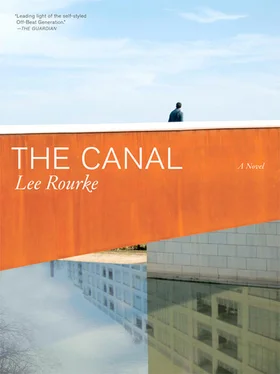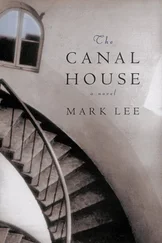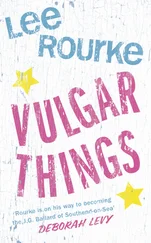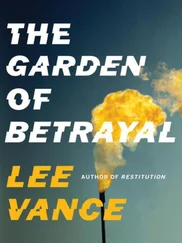“ No . It’s my right as an innocent person to remain on this bus …”
“If you don’t get off my bus this instant I will turn off the engine and no one will go anywhere …”
“Turn it off … I’m going nowhere.”
He turned off the engine.
The entire bus became silent.
Then, when the passengers had finally realised what was happening, everything seemed to erupt: a cacophony of anger and hatred. All it took was the silence; the sense that things had stalled.
The passengers’ shrill voices cut into me.
“ Get off! ”
“ Get off the bus, you fool! ”
“ Get off! I need to be somewhere! ”
“ Now! ”
“ Leave, fuckin’ innit! ”
“ I’ll throw you off if you don’t move! ”
“ Get off now! ”
As all this was happening, the driver stepped out of his cabin. He was small and stocky with a low centre of gravity. He gripped me by the collar, and in one swift move managed to open the emergency exit and throw me off the bus and onto the pavement. I noticed my friend, halfway up the stairs to the upper deck, looking down at me. Before my friend could get off the bus the driver shut the door, started up the engine and resumed his journey. I can still remember each face, peering down through the window as the bus trundled away from me, bathing me in its rotten fumes.
It was at that moment, there on the cold pavement, that I realised I was ordinary and not destined for great things.
We were at the top end of Essex Road, near to Balls Pond Road. She suddenly turned right, heading east into De Beauvoir Town. The traffic was noisy, that incessant London drone. Gaggles of scooterists were hogging the road, reviving their hairdryer-like engines at the lights, cutting corners and generally terrifying any pedestrians who attempted to cross the road before them. Some took particular delight in inching forwards, as if attempting to mow one down, as people crossed at the pelican crossing. The road seemed to be filled with them, buzzing about like swarms of angry wasps without a care in the world. It was completely depressing.
I’ve never wanted to hang around in packs. Even when I was at the age I was supposed to, and my friends ventured off to Highbury to watch the Arsenal every other weekend, I would make my excuses until they eventually stopped asking me.
She had stopped running and was walking along quite slowly now, naturally puffed and out of breath. She stopped a couple of times to stroke a cat that had been following her; a small tabby cat that looked undernourished, though probably wasn’t — being as most domesticated cats are overfed and quite fat. She crouched close to it, down to the ground, the cat looking up, circling her, rubbing its scent glands against her shins, lifting up its tail, exposing its anus for her to sniff, to inspect, to classify DNA, then falling to the ground, rolling onto its back in complete and utter submission.
I stopped walking and rested by a garden wall to watch. She obviously knew I was there, watching her and the cat, but she didn’t once acknowledge my presence behind her.
The cat soon trotted away, content with itself, as an Islington Refuge Collection van pulled into the street, its pack of binmen it contained quickly scurrying in and out of gardens, rummaging around for black sacks of rubbish. The cat fled quickly, down into a basement flat’s front garden — if you could call it that — and out of the way.
Again, she began to walk, although she set off with a little bit more purpose this time. It seemed she had finally decided where it was she wanted to go. I naturally presumed she was going home, back to the safety of her flat, but she turned immediately right onto Southgate Road, heading in the direction of the canal again. It made perfect sense to me: she had to find somewhere she could feel anonymous, where she could observe and become invisible — where she could belong. I followed her along Southgate Road, past the Northgate Pub and the small cluster of shops next to it. The canal wasn’t that far away.
I was beginning to realise that I had lost control — what little of it I had had in the first place, that is. No — that I had never had control. Boredom had left me behind, I had succumb to its weight, its unheard-of centre within me. I had embraced it and it had completely consumed me and now I was bored of it. I was bored of boredom. There was nothing I could really do about this. I was like everyone else: I needed something to fill the gap, the time that dragged us, and it , along with it, to return me to the ground beneath my feet and hide away from our gaping hole like everyone else. Who was she to me? Why was she suddenly in my life? Was she there to serve as some warning? Revealing all to me? Everything that isn’t really there?
Following her along Southgate Road, as I did, seemed real to me, like I was snapping back from a daydream, or some unknowable space outside of myself. As we neared the canal things began to focus within me again; things became normal as we drew near to its space — the only space we could exist together within, where things started, at the boundary of Hackney on Islington, on the canal, by the side of the rusting iron bridge that connected everything.
I was standing by the site of the old Thomas Briggs factory, near where the old gates still stood, the last remnants of the old bell still visible, Factory carved, imperiously into the gnarled masonry beneath it. On the many times I would pass it by I would always make a point of touching it, pressing into it, where the button for the bell used to be (which had long since gone), trying to imagine the factory workers queuing outside each morning, or streaming through the open gates of an evening after a hard shift with the machines and the clatter, and the toil. The area where the old factory stood is called Rosemary Gardens, and nearby stood two pubs — one now converted into a house — where there used to be cockfighting and, much later, trips in an air balloon that used to be tethered there. It’s also the site were the Levellers were first formed: the radical left-wing movement of the seventeenth century whose members wore a sprig of rosemary in their hats at their meetings, held in an old alehouse that once stood on that site. The remaining pub — The Rosemary Branch — is named in honour of them. The whole area, a nondescript place to most people, holds huge historical significance. Yet people will merrily walk by it without a care in the world. Upstairs in the Rosemary Branch is a small theatre. One evening I got to talking to a young actress at the bar. She was starring in some production there. I remember her staring out of the window and seriously ask me: ‘ How does one get anywhere from here? We’re in the middle of nowhere .’ I wanted to explain to her everything I knew about Rosemary Gardens. I wanted to say to her that things didn’t revolve around her, that things had already happened many times over in that very spot. But I didn’t. I sipped my drink and listened to her ignorant nonsense.
I could smell the murky water of the canal emanating up onto the road where it ran parallel with the canal for two-hundred yards or so before stopping — Southgate Road, that is — at New North Road, the canal carrying on down towards Islington.
She stopped. She was standing by the Rosemary Branch.
The murky water took on a different stench up there by the road, less pungent, less silty. It had mixed with the exhaust fumes and transformed into something else, machinelike, industrious, something old tainted by a new age.
Читать дальше












